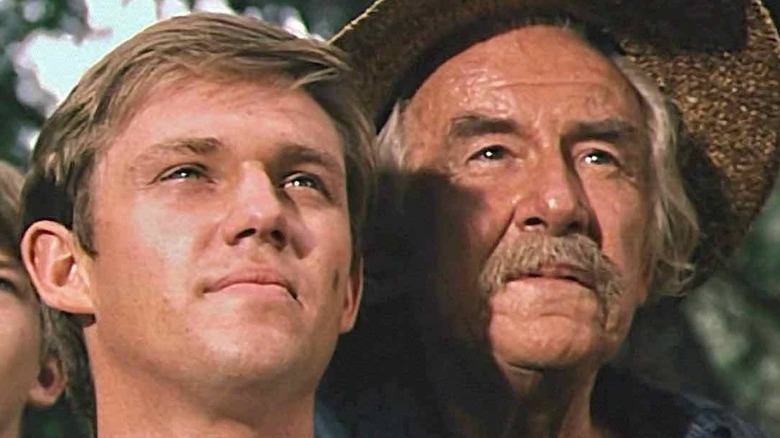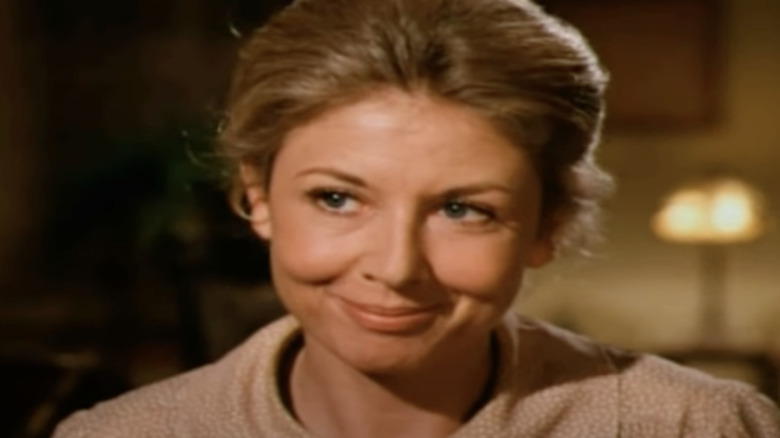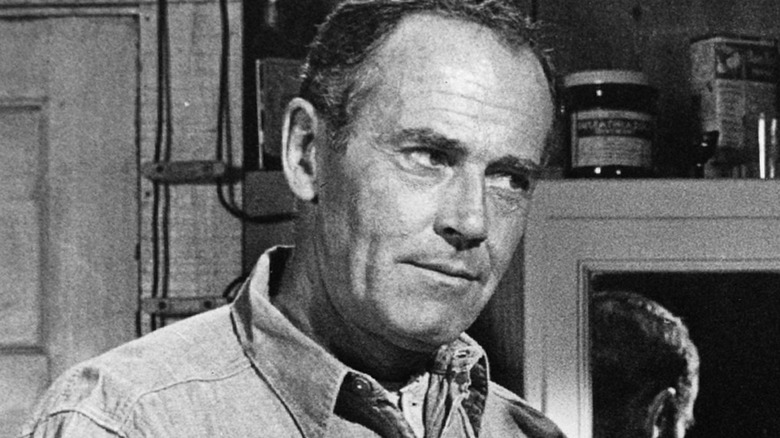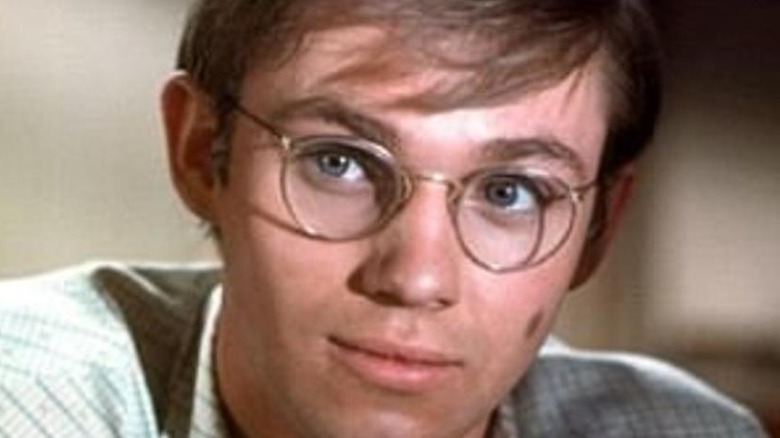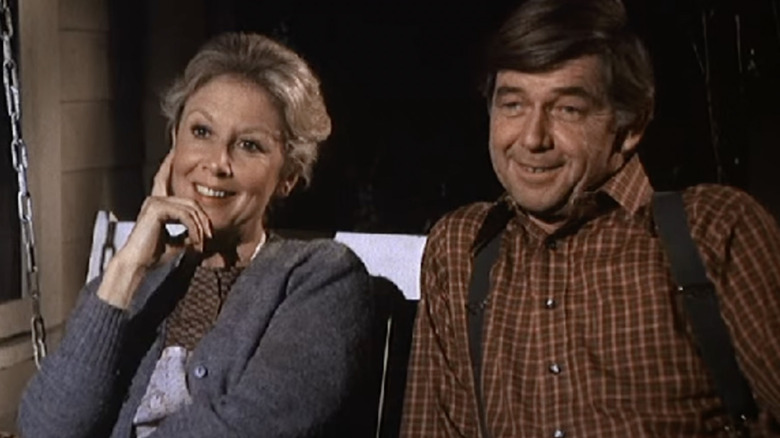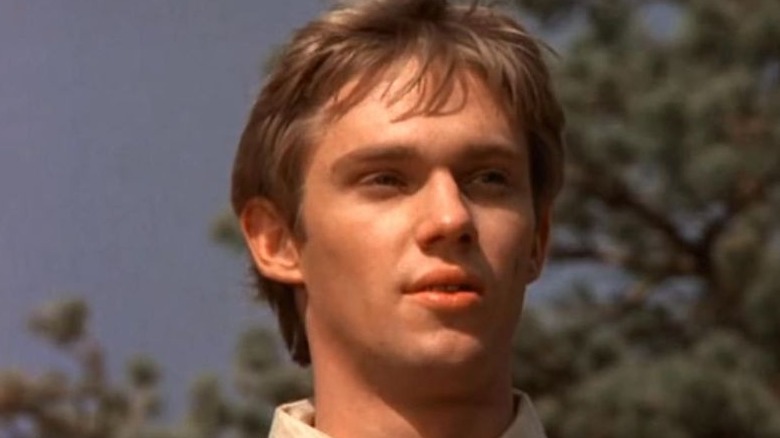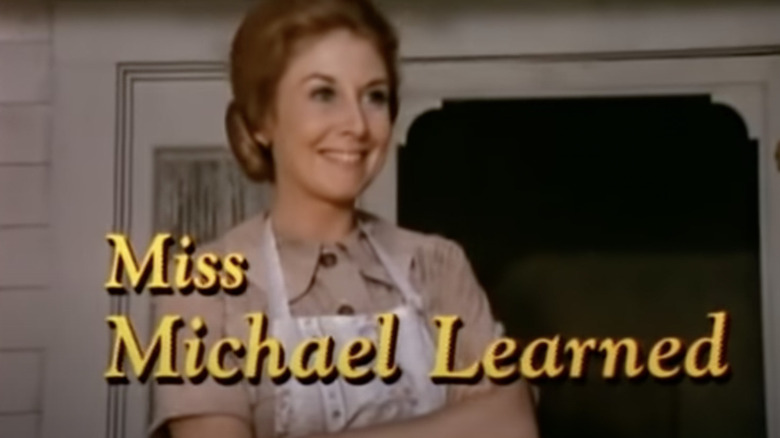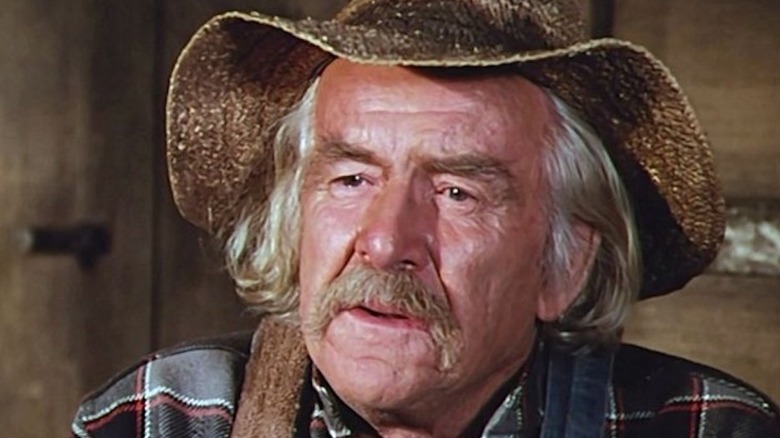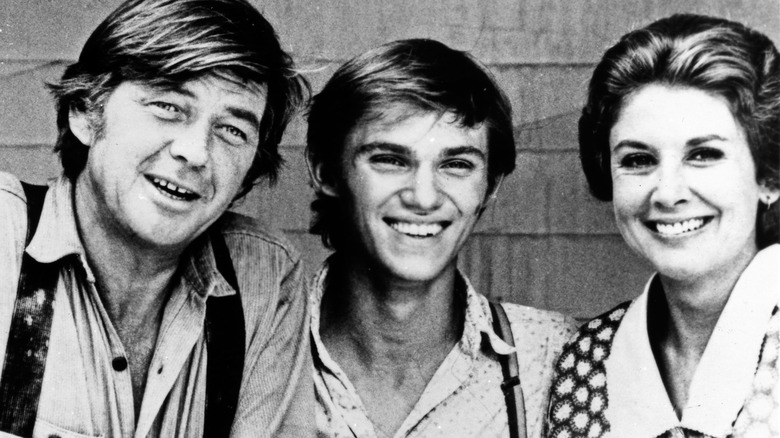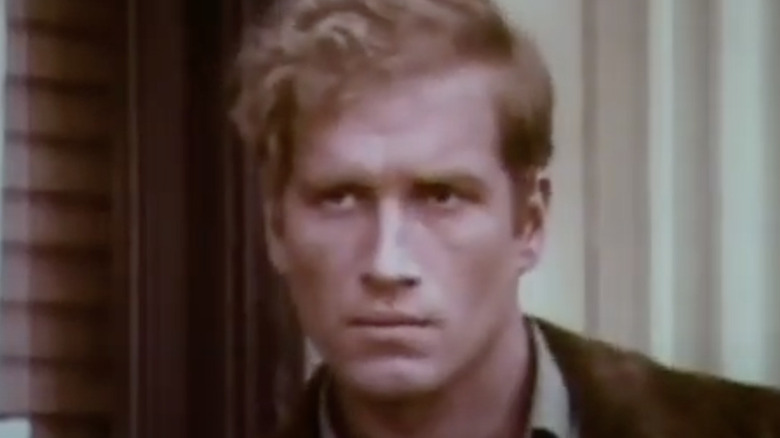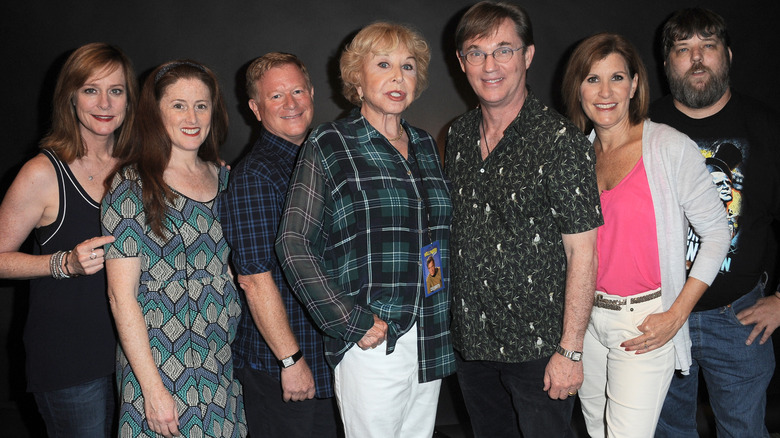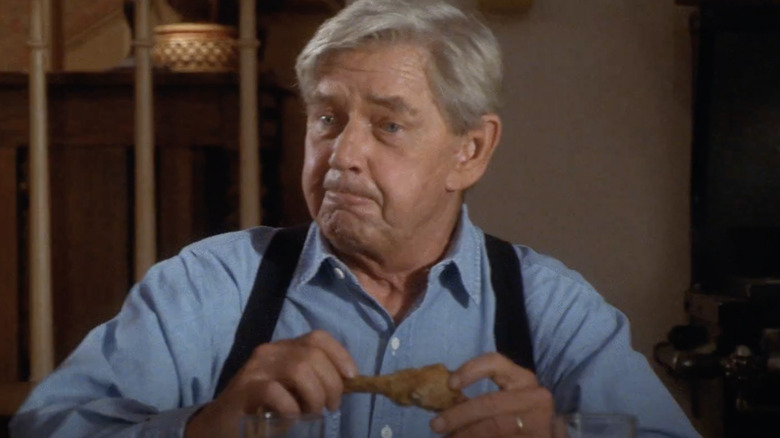The Untold Truth Of The Waltons
"The Waltons" is arguably the most unabashedly, daringly wholesome and low-key show in TV history. Like a warm blanket made of images and sound, it concerned the day-to-day relationships and struggles of the Waltons, a multi-generational family living on and working the family's valuable plot of land, Walton's Mountain, in the heat of the beautiful rolling hills of rural Virginia. Based on the childhood recollections of creator Earl Hamner, Jr., it harkened back to times that were both harder and simpler — it took place amidst the economic devastation of the Great Depression of the 1930s. In spite of, or perhaps because of, its stark juxtaposition with early 1970s society and culture, "The Waltons" was a monster hit, one of the most watched shows on broadcast TV for most of its nine-season run, which found the sprawling, tight-knit family endure just about every hardship and celebrate just about every joy that kin might experience together. So go say goodnight to Ma, Pa, the grandparents, and all six of your siblings, and feel the love of the untold truth of "The Waltons."
The producers almost got sued for being copycats
Before "The Waltons" was "The Waltons," it was a 1971 made-for-CBS movie called "The Homecoming," based on a novel by author and scriptwriter Earl Hamner Jr. According to an Archive of American Television interview, producer Lee Rich of Lorimar Television bought the adaptation rights in 1970, before the book was even released. The film "did a 39 share, and it was a smash," Rich said, meaning that 39 percent of all TV sets in America on December 19, 1971 were tuned to CBS's broadcast of "The Homecoming: A Christmas Story."
While CBS would follow through and expand that movie into "The Waltons" a year later, Lorimar had some sticky intellectual property issues to solve. Before "The Homecoming," Hamner had published the life-inspired novel "Spencer's Mountain," adapted into a movie in 1963. The characters from "The Homecoming" and "The Waltons" were virtually the same characters, meaning the rights-holders to the film version of "Spencer's Mountain" had an extremely solid claim of ownership on most of the content of this burgeoning series. "We resolved the problem by, when we sold the series, to give Warner Bros. the distribution rights and that's what we did," Rich explained, meaning Warner made money off of "The Waltons," same as Lorimar and CBS.
The Waltons almost starred Henry Fonda
While the original "Waltons"-hinting TV movie "The Homecoming: A Christmas Story" was a success, nominated for three major prizes at the 1972 Emmy Awards and earning monster viewership figures, CBS wasn't totally convinced that a weekly, recurring series directly spun off from it would ever be a hit. According to the New York Times, CBS insisted that Lorimar Productions founder and executive producer Lee Rich attach a big-name actor to the project to ensure a healthy acceptance. "So we showed the pilot to Henry Fonda," he said, meaning that CBS wanted the Oscar-winning star of "The Grapes of Wrath" and "On Golden Pond" to play John Walton Sr., the role that would eventually go, in the long-term, to Ralph Waite. Fonda watched the pilot and wanted no part of it. "Afterward, he turned around to me and said: 'What do you want me for? The family is the star. You don't need me.'"
Ironically, Fonda had already starred in a version of "The Waltons." In 1963, he played a mountain family patriarch in "Spencer's Mountain," a film based on a semi-autobiographical novel by Earl Hamner Jr., creator of "The Waltons."
The Waltons was expected to fail
In the early 1970s, CBS instituted what's known in TV lore as "The Rural Purge," cancelling nearly all of its shows set in the country, or which appealed to an older, non-urban demographic with less disposable income. Out went long-running hits like "Green Acres," "The Beverly Hillbillies," and "The Red Skelton Show," and in came city sitcoms about young professionals such as "The Mary Tyler Moore Show" and "The Bob Newhart Show."
CBS was widely criticized for seemingly abandoning its audience, and the debut of the nostalgic, rural drama "The Waltons" in the midst of the Rural Purge could be perceived as an olive branch to those now-underserved, loyal viewers. Nevertheless, the network didn't seem to have much confidence or faith in it, placing it on the fall 1972 TV schedule (via InThe70s) at Thursdays at 8 p.m., opposite ABC's hip spy show "The Mod Squad" and NBC's "The Flip Wilson Show," the #2 show on all of TV in the previous season. Creator Earl Hamner Jr. told the Los Angeles Times that in 1972, critics "predicted it would not last a season."
"We were basically on the death block," "Waltons" cast member Judy Norton told Zoomer. "The producers did a major grassroots campaign to gather an audience, particularly in middle America." The producers' publicity campaign — not the network's — worked. "The Waltons" finished its first season in the top 30 in the ratings, while viewership numbers of "The Mod Squad" and "The Flip Wilson Show" tumbled dramatically.
The parents on The Waltons were in love in real life, too
Some TV couples become lovable and notable because of the excellent chemistry from the actors doing their job — they seem so believable as a married pair that it adds to the enjoyment of the show. Once in a while, those intense couples aren't really acting at all, using their real-life attraction to one another to inform their on-screen dynamic. Ralph Waite and Michael Learned provided the foundation for "The Waltons" as kind but firm parents John Sr. and Olivia Walton, respectively. Their characters were often respectful and affectionate, because those are things Waite and Learned felt for each other, too, but never fully acted on.
"We had a deep love for each other that we would have ruined if we had taken it that extra step. We never did. We thought about it, but we didn't," Learned told The Daily Mail. "And I think that's why we became a spiritual husband and wife if you will." Learned also credits Waite with helping her cope with burgeoning substance abuse issues. "He pointed out that he thought that I was drinking too much," she said. "I haven't had a drink in 42 years of anything alcoholic and it is because of Ralph."
Richard Thomas left, but his character didn't
Richard Thomas landed the role of John-Boy Walton (a thoughtful writer whom show creator Earl Hamner Jr. based on himself) at age 21. He told Studio 10 that he wasn't sure he wanted to commit to a regular television series, as his film career was blossoming, but that he thought that the character was so "beautifully written" that he couldn't say no. "The Waltons" made Thomas into a small-screen superstar, top-billed over his more seasoned castmates and winning an Emmy Award in 1973.
But Thomas was a victim of success — in 1977, he left "The Waltons." "Richard left at the end of the fifth year I think it was because he was getting typecast," Hamner told the Archive of American Television. "And I think that it was limiting his future to be so identified as this one character. I was desolate to lose him but I think it was best that he move on." Oddly, instead of writing off the character, producers chose to recast a new actor in the role of John-Boy, with Robert Wightman joining "The Waltons" until its end in 1981 and staying on for a 1982 made-for-TV sequel movie. "It was a strange thing to do because it's very hard for people to change their idea of who a character is and what he looks like, and what he or she sounds like. And I don't know that it was a very successful shift," Thomas said.
Michael Learned wasn't supposed to be on The Waltons
The early years of "The Waltons" included a credit for "Miss Michael Learned," noting the actress portraying Olivia Walton. The "Miss" was added, according to MeTV, because producers worried viewers could be confused by a female actor with a traditionally male name playing a woman, particularly on account of how Learned wasn't all that experienced or well-known when the show debuted.
Learned wasn't even supposed to play Olivia at all. In "The Homecoming: A Christmas Story," the 1971 made-for-TV movie that inspired "The Waltons," Academy Award-winning "Hud" star Patricia Neal portrayed Olivia. Neal had suffered a stroke just before filming, according to "Waltons" creator Earl Hamner Jr. at the Archive of American Television, so when the time came to continue the movie as a series, she wasn't offered the role. "We didn't think Patricia, because of her health, didn't have the strength to do the series," Hamner explained.
Learned left "The Waltons" in 1979, two years before the show's end in 1981. (Olivia was said to be residing in a sanatorium, recovering from tuberculosis.) The actor had a hard time dealing with Robert Wightman replacing Richard Thomas. "When John-Boy came back with a new face and a new voice, it was like something happened, I just couldn't do it anymore," Learned told Fox News. "Also, I felt a lot of the times I was sitting around for 14 hours saying, 'More coffee John.' The fact is, I was bored."
There were a lot of abrupt cast changes
The longer a show is in production, the more likely it is to go through some cast changes, owing to either creative decisions on the part of the writers or actor exits; "The Waltons" can pin the blame on both. When the show began, actors Kami Cotler and David W. Harper were quite young, 7 and 11 years old, respectively. As the show aged, so did those performers into teenage-hood. To make up for the dwindling little-kid quotient on the all-ages show about an all-ages family, the show added two new characters for the eighth season in 1979: Serena and Jeffrey Burton (Martha Nix and Keith Coogan), the troubled children of Olivia Walton's cousin, Rose, who come to visit and then permanently stay on Walton's Mountain, or at least for a year until they disappeared from the series unceremoniously.
As for Will Geer, who played Grandpa Zebulon Walton for the first seven seasons of "The Waltons," he died in 1978, prompting the show's writers to have his character die, too.
The Waltons was surprisingly renewed and then suddenly cancelled
By the middle of 1979, "The Waltons" was in disarray. Emmy-winning lead actor Richard Thomas left the show to pursue other career opportunities before he found himself typecast in other John-Boy-type roles, Michael Learned left out of boredom, and Will Geer had died. Falling ratings indicated audiences were losing interest, with "The Waltons" declining to 36th place in 1978-79, down from 18th place just two years prior. The proverbial writing was on the wall for the producers, writers, and cast of "The Waltons."
"I thought maybe last year was our last year, but the network feels that we still have something to say," cast member Ralph Waite told KOLN/KGIN-TV in 1980. CBS renewed "The Waltons" for that surprise eighth season, and then once more for a ninth season. However, Waite (John Walton Sr.) disappeared from "The Waltons" halfway through season nine, which didn't end with a big final episode at all, because CBS cancelled it after production had concluded on that batch of episodes, according to cast member Judy Norton's YouTube channel (via Outsider).
The Waltons inspired many imitations
"The Waltons," with its combination of nostalgia for pre-World War II America and warm, wholesome plots about family and rural life, proved irresistible to millions of viewers in the culturally and socially explosive 1970s. According to the TV Ratings Guide, it ranked among the top 30 most watched shows on TV in its first season (1972-73), and a year later, it shot up to #2, making it the one of the highest rated dramas on the air. The other networks, as well as "The Waltons" home network CBS, took notice, and in the mid-1970s tried to replicate the specific formula that made the show so popular and resonant with so many viewers.
A lot of shows that were a lot like "The Waltons," if not obvious knockoffs, came and usually departed quickly from the broadcast schedule over the next few years. The drama about Swedish immigrants settling in America, "The New Land" (starring Kurt Russell), lasted just six episodes in 1974. The 28-episode "Apple's Way" was essentially "The Waltons" but in a small and extremely rural Iowa town in the present day (and created by "Waltons" scribe Earl Hamner Jr.). The 1974-75 drama "The Manhunter" was set in the Great Depression — like "The Waltons" — and concerned a farmer moonlighting as a bounty hunter, while "These Are the Days" was a short-lived Saturday morning cartoon take on its predecessor, following the hardscrabble Day family in the early 1900s.
What became of the Walton children?
As depicted over hundreds of episodes of "The Waltons," John Walton Sr. and Olivia Walton raised a total of seven children who survived past infancy. Of the actors who played the members of that large Virginia backwoods brood, only one, Richard Thomas, was able to shed his role — that of eldest son John-Boy Walton — and move on to other major acting successes. For example, he's starred in many Broadway productions (including a 2017 staging of "The Little Foxes," which earned him a Tony Award nomination) as well as the landmark Stephen King miniseries "It" and the FX drama "The Americans."
Thomas' former television siblings have largely endured the so-called curse of child performers, while others happily persist on the fringes of showbiz. Jon Walmsley (Jason Walton) voiced Christopher Robin in some "Winnie the Pooh" projects for Disney and became a prolific session musician and songwriter. Mary McDonough (Erin Walton) wrote the novel "Christmas on Honeysuckle Lane," which was adapted into a Hallmark holiday movie, Judy Norton (Mary-Ellen Walton) posed for Playboy in 1985 and set some skydiving records, and Kami Cotler (Elizabeth Walton) became a teacher and administrator.
There are lots of Waltons movies and one on the way
In the 1980-81 season, with Michael Learned and Richard Thomas — the original actors playing Olivia Walton and John-Boy Walton — gone and Will Geer (Grandpa Walton) deceased, "The Waltons" had seemingly worn out its welcome after nine years on the air. After it fell to 30th place in the ratings, CBS cancelled "The Waltons." However, the show didn't ever disappear forever, and it didn't even go away for that long. "The Waltons" began as the 1971 made-for-TV film "The Homecoming: A Christmas Story," and it endured into the 1980s and beyond as telefilms, too. In 1982, scarcely more than a year after the series ended, the cast reunited three times: for "A Wedding on Walton's Mountain," "Mother's Day on Waltons Mountain," and "A Day for Thanks on Walton's Mountain." In the '90s, most would return for "A Walton Thanksgiving Reunion," set in late November 1963 during the week of the assassination of President John F. Kennedy. "A Walton Wedding" and "A Walton Easter" followed in 1995 and 1997, representing the last round of goodnights.
In May 2021 (via Forbes), The CW announced the upcoming holiday event movie "The Waltons' Homecoming." A remake of the first "Waltons" TV movie from exactly 50 years prior, it will be set in rural Virginia in 1933 and feature a whole new cast — with the exception of Richard Thomas, the original John-Boy, who will step into late creator Earl Hamner Jr.'s role as narrator on the November 2021 project.
